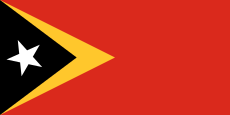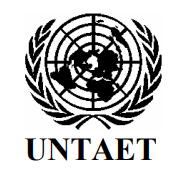
The United Nations Transitional Administration in East Timor (UNTAET),, was a United Nations mission in East Timor that aimed to solve the decades long East Timorese crisis in the area occupied by Indonesian military. UNTAET provided an interim civil administration and a peacekeeping mission in the territory of East Timor, from its establishment on 25 October 1999, until its independence on 20 May 2002, following the outcome of the East Timor Special Autonomy Referendum. The transitional administration was established by United Nations Security Council Resolution 1272 in 1999.

East Timor, officially the Democratic Republic of Timor-Leste, is a country in Southeast Asia and Oceania. The country comprises the eastern half of the island of Timor and the nearby islands of Atauro and Jaco. The first inhabitants are thought to be descendant of Australoid and Melanesian peoples. The Portuguese began to trade with Timor by the early 16th century and colonised it throughout the mid-century. Skirmishing with the Dutch in the region eventually resulted in an 1859 treaty for which Portugal ceded the western half of the island. Imperial Japan occupied East Timor during World War II, but Portugal resumed colonial authority after the Japanese surrender.

The Timor Leste Defence Force is the military of East Timor. The F-FDTL was established in February 2001 and comprises two infantry battalions, small naval and air components and several supporting units.

The International Force East Timor (INTERFET) was a multinational non-United Nations peacemaking task force, organised and led by Australia in accordance with United Nations resolutions to address the humanitarian and security crisis that took place in East Timor from 1999–2000 until the arrival of UN peacekeepers. INTERFET was commanded by an Australian military officer, Major General Peter Cosgrove.

The United Nations Integrated Mission in East Timor (UNMIT) was established on 25 August 2006 by UN Security Council Resolution 1704. Its objectives are "to support the Government in consolidating stability, enhancing a culture of democratic governance, and facilitating political dialogue among Timorese stakeholders, in their efforts to bring about a process of national reconciliation and to foster social cohesion". In its most recent resolution on UNMIT, the Council extended its mandate until 26 February 2012. UNMIT and ISF troops left the country at the end of 2012.

An independence referendum was held in East Timor on 30 August 1999. The referendum's origins lay with the request made by the President of Indonesia, B. J. Habibie, to the United Nations Secretary-General Kofi Annan on 27 January 1999, for the United Nations to hold a referendum, whereby the Indonesian province would be given choice of either greater autonomy within Indonesia or independence.

The Indonesian occupation of East Timor began in December 1975 and lasted until October 1999. After centuries of Portuguese colonial rule in East Timor, a 1974 coup in Portugal led to the decolonisation of its former colonies, creating instability in East Timor and leaving its future uncertain. After a small-scale civil war, the pro-independence Fretilin declared victory in the capital city of Dili and declared an independent East Timor on 28 November 1975.

The 1999 East Timorese crisis began with attacks by pro-Indonesia militia groups on civilians, and expanded to general violence throughout the country, centred in the capital Dili. The violence intensified after a majority of eligible East Timorese voters chose independence from Indonesia. Some 1,400 civilians are believed to have died. A UN-authorized force (INTERFET) consisting mainly of Australian Defence Force personnel was deployed to East Timor to establish and maintain peace.

East Timor and Indonesia established diplomatic relations in 2002. Both share the island of Timor. Indonesia invaded the former Portuguese colony in 1975 and annexed East Timor in 1976, maintaining East Timor as its 27th province until a United Nations-sponsored referendum in 1999, in which the people of East Timor chose independence. Following a United Nations interim administration, East Timor gained independence in 2002. Indonesia has an embassy in Dili. East Timor has an embassy in Jakarta and consulates in Denpasar and Kupang.
United Nations Security Council resolution 1246, adopted unanimously on 11 June 1999, after recalling previous resolutions on East Timor, particularly Resolution 1236 (1999), the council established the United Nations Mission in East Timor (UNAMET) to organise and conduct the East Timor Special Autonomy Referendum on the future status of East Timor, scheduled for August 1999.
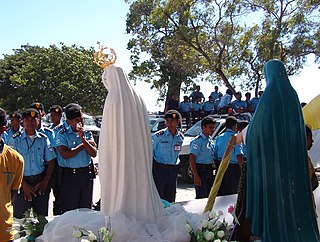
United Nations Security Council resolution 1262, adopted unanimously on 27 August 1999, after recalling previous resolutions on East Timor, particularly resolutions 1246 (1999) and 1257 (1999), the Council extended the mandate of the United Nations Mission in East Timor (UNAMET) until 30 November 1999.
United Nations Security Council resolution 1264, adopted unanimously on 15 September 1999, after recalling previous resolutions on East Timor (Timor-Leste), the Council authorised the establishment of the multinational International Force for East Timor (INTERFET) to restore peace and security in the territory, facilitate humanitarian assistance and protect the United Nations Mission in East Timor (UNAMET).
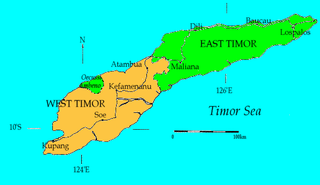
United Nations Security Council resolution 1319, adopted unanimously on 8 September 2000, after recalling previous resolutions on East Timor (Timor-Leste), the Council demanded that Indonesia take steps to disarm and disband militia on the island following the killing of three United Nations staff.

United Nations Security Council resolution 1338, adopted unanimously on 31 January 2001, after recalling previous resolutions on East Timor (Timor-Leste), particularly resolutions 1272 (1999) and 1319 (2000), the Council extended the mandate of the United Nations Transitional Administration in East Timor (UNTAET) for a year until 31 January 2002.
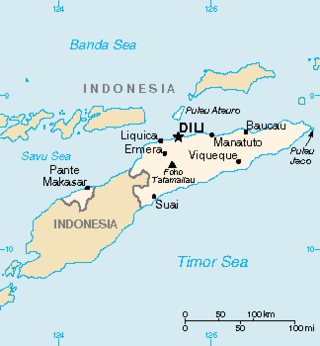
United Nations Security Council resolution 1392, adopted unanimously on 31 January 2002, after recalling previous resolutions on East Timor (Timor-Leste), particularly resolutions 1272 (1999) and 1338 (2001), the Council extended the mandate of the United Nations Transitional Administration in East Timor (UNTAET) until 20 May 2002.
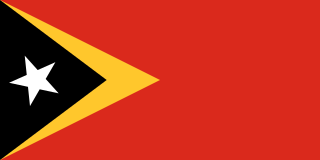
United Nations Security Council resolution 1410, adopted unanimously on 17 May 2002, after recalling previous resolutions on East Timor (Timor-Leste), particularly resolutions 1272 (1999), 1338 (2001) and 1392 (2002), the council established the United Nations Mission of Support to East Timor (UNMISET) to replace the United Nations Transitional Administration in East Timor (UNTAET).
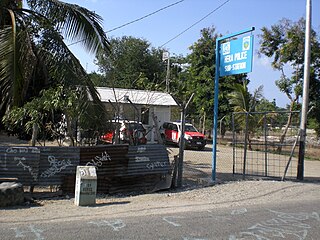
United Nations Security Council resolution 1473, adopted unanimously on 4 April 2003, after recalling previous resolutions on East Timor (Timor-Leste), particularly Resolution 1410 (2002), the Council adjusted the United Nations Mission of Support to East Timor (UNMISET) to improve its capacity to train the National Police of East Timor in light of the security situation, and slowed the downsizing of the operation.

United Nations Security Council resolution 1543 was adopted unanimously on 14 May 2004, after reaffirming previous resolutions on East Timor (Timor-Leste), particularly resolutions 1410 (2002), 1473 (2003) and 1480 (2003). The Council extended the mandate of the United Nations Mission of Support to East Timor (UNMISET) for six months, with a view to extending it for a further final period of six months until 20 May 2005.
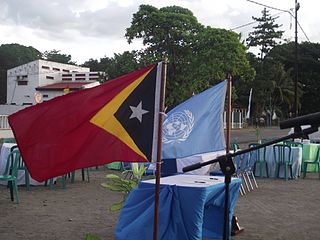
East Timor independence formally occurred on 20 May 2002.

United Nations Administered East Timor refers to the period between 25 October 1999 and 20 May 2002 when East Timor was administered by the United Nations Transitional Administration in East Timor as a United Nations protectorate.
